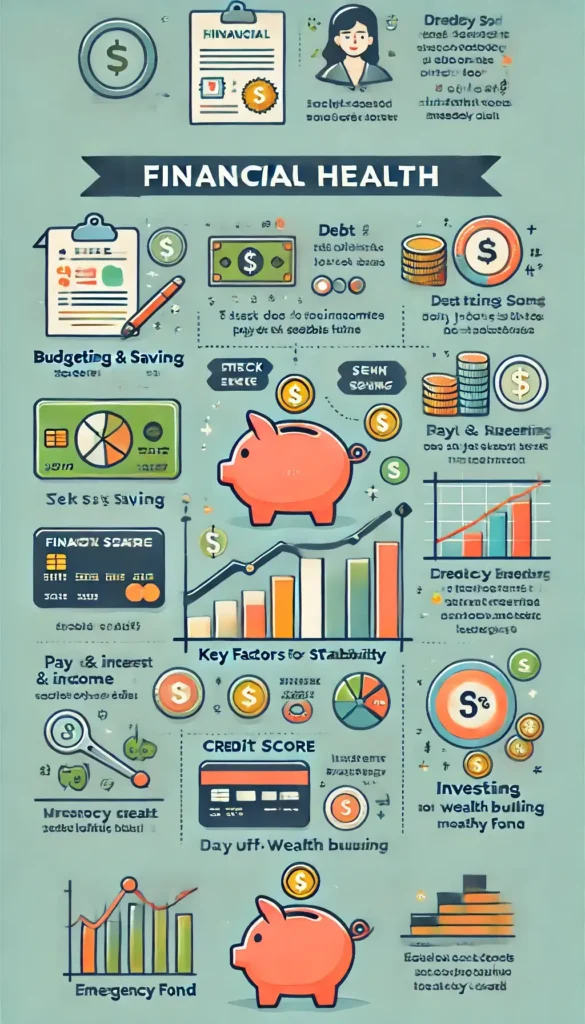Financial health is the cornerstone of a stable and stress-free life. It’s not just about how much money you make but how well you manage it. Whether you’re saving for a big purchase, planning for retirement, or simply trying to stay out of debt, understanding and improving your financial health is essential. In this guide, we’ll break down how financial health works, ways to measure it, and actionable steps to improve it—with a special focus on credit.
How Financial Health Works
Financial health refers to the state of your personal finances, including your ability to manage expenses, save for the future, and handle unexpected financial challenges. It’s a reflection of your overall financial well-being and is influenced by factors like income, debt, savings, and credit.
Think of financial health as a puzzle with four key pieces:
- Income: Your earnings from work, investments, or other sources.
- Expenses: Your monthly bills, discretionary spending, and debt payments.
- Savings: Money set aside for emergencies, goals, or retirement.
- Debt and Credit: How much you owe and how well you manage it.
When these pieces are balanced, you’re in good financial health. But if one area is neglected, it can throw everything off balance. For example, high debt or poor credit can limit your ability to save or invest, while low income can make it harder to cover expenses.
Ways to Measure Your Financial Health
To improve your financial health, you must first assess where you stand. Here are some key metrics to measure it:
- Net Worth
Calculate your net worth by subtracting your liabilities (debts) from your assets (savings, investments, property). A positive net worth is a good sign of financial health. - Debt-to-Income Ratio (DTI)
Your DTI compares your monthly debt payments to your gross monthly income. A DTI below 36% is generally considered healthy. - Savings Rate
This measures how much of your income you save each month. Aim to save at least 20% of your income, but even small amounts add up over time. - Credit Score
Your credit score is a key indicator of your financial health. A score of 670 or higher is considered good, while a score below 580 may need improvement. - Emergency Fund
Do you have enough savings to cover 3-6 months of living expenses? If not, this is an area to focus on.
Table of Debt-to-Income Ratio (DTI)
| DTI Ratio | Category | What It Means | Impact on Home Loan Eligibility |
|---|---|---|---|
| Below 20% | Excellent | Very low debt compared to income | Best loan terms, easiest approval |
| 20% – 35% | Good | Manageable debt level | Qualifies for most mortgage options |
| 36% – 43% | Acceptable | Considered the maximum safe limit | Eligible for conventional and government-backed loans |
| 44% – 50% | Risky | High debt burden | Limited mortgage options, may require compensating factors (e.g., higher down payment) |
| Above 50% | High Risk | Excessive debt compared to income | Limited mortgage options may require compensating factors (e.g., higher down payment) |

Signs of Poor Financial Health
Understanding the warning signs of financial distress is the first step to addressing problems.
Common Indicators
- Overreliance on Credit: Frequently using credit cards to cover basic needs.
- Missed Payments: Struggling to pay bills or loans on time.
- Low or No Savings: Lack of an emergency fund for unforeseen events.
- High Debt-to-Income Ratio: Too much of your income goes toward debt repayment.
| Indicator | Impact |
|---|---|
| Living paycheck to paycheck | No room for saving or unexpected expenses. |
| High-interest debt | Significant financial drain due to compounding interest. |
| Minimal retirement savings | Increased reliance on social security or late-career employment. |
How to Improve Your Financial Health
Improving your financial health doesn’t happen overnight, but you can make significant progress with consistent effort. Here are some actionable steps:
1. Creating a Budget is a key to financial health
A budget helps you track your income and expenses, ensuring you live within your means. Use the 50/30/20 rule as a guideline:
- 50% for needs (rent, utilities, groceries)
- 30% for wants (entertainment, dining out)
- 20% for savings and debt repayment
See our guide of 10 Practical Budgeting Strategies That Actually Work for more approaches to budgeting.
2. Pay Down Debt
High-interest debt, like credit card balances, can drain your finances. Focus on paying off these debts first using strategies like the debt snowball (paying smallest debts first) or debt avalanche (paying highest-interest debts first).
3. Build an Emergency Fund
Start by saving $1,000, then aim for 3-6 months’ expenses. This fund will protect you from unexpected costs like medical bills or car repairs. For more information, see our guide Basics of Emergency Funds: Simple Plans for Financial Security.
4. Invest in Your Future
Contribute to retirement accounts like a 401(k) or IRA. Even small, regular contributions can grow significantly over time thanks to compound interest.
5. Automate Savings and Payments
Set up automatic transfers to your savings account and automatic payments for bills. This ensures you stay on track without thinking about it.
Focus on Credit: A Key to Financial Health
Your credit score is one of the most important aspects of your financial health. It affects your ability to get loans, secure low-interest rates, and even rent an apartment. Here’s how to improve and maintain good credit:
1. Check Your Credit Report Regularly
Request a free credit report from AnnualCreditReport.com and review it for errors. Dispute any inaccuracies that could be dragging your score down.
2. Pay Bills on Time
Payment history makes up 35% of your credit score. Set up reminders or automatic payments to avoid late payments.
3. Reduce Credit Card Balances
Keep your credit utilization (the percentage of available credit you’re using) below 30%. Paying down balances can quickly boost your score.
4. Avoid Opening Too Many New Accounts
Each new credit application results in a hard inquiry, which can temporarily lower your score. Only apply for credit when necessary.
5. Build a Positive Credit History
If you have a limited credit history, consider becoming an authorized user on someone else’s credit card or taking out a small credit-builder loan.
Final Thoughts
Improving your financial health is a journey, not a destination. By understanding how financial health works, measuring your current situation, and taking steps to improve it—especially focusing on credit—you can build a solid foundation for a secure and prosperous future.
Start small, stay consistent, and celebrate your progress along the way. Remember, every step you take toward better financial health is a step toward a brighter, more confident future.
Ready to take control of your finances? Start today by creating a budget, checking your credit score, and setting a savings goal. Your future self will thank you!
Frequently Asked Questions
1. How can I stick to a budget without feeling restricted?
Sticking to a budget doesn’t mean cutting out all fun. Use the 50/30/20 rule to allocate 30% of your income to wants, like entertainment or dining out. This way, you can enjoy life while still saving and paying bills responsibly.
2. What’s the difference between a credit score and a credit report?
A credit report is a detailed record of your credit history, including loans, credit cards, and payment behavior. A credit score is a three-digit number (ranging from 300 to 850) that summarizes your creditworthiness based on the information in your credit report.
3. How can I save money if I’m living paycheck to paycheck?
Start small by cutting non-essential expenses, like subscriptions or dining out. Look for ways to increase your income, such as freelancing or selling unused items. Even saving $10-$20 per week can add up over time and help you build an emergency fund.
4. Is it better to pay off debt or save money first?
It’s important to do both. Start by saving a small emergency fund (e.g., $1,000) to cover unexpected expenses. Then, focus on paying off high-interest debt while continuing to save gradually. This balanced approach ensures you’re prepared for emergencies while reducing debt.
5. How often should I check my credit score?
Check your credit score at least once a year, but ideally every 3-4 months. Regular monitoring helps you catch errors, track progress, and identify areas for improvement. Many banks and credit card companies offer free credit score access.
6. What’s the best way to handle unexpected expenses?
An emergency fund is the best way to handle unexpected expenses. If you don’t have one yet, consider using a low-interest personal loan or a 0% APR credit card as a temporary solution. Avoid high-interest payday loans, as they can worsen your financial situation.
7. Can improving my financial health help me qualify for a mortgage?
Yes! Improving your financial health—by paying down debt, increasing savings, and boosting your credit score—can help you qualify for a mortgage with better interest rates and terms. Lenders look for stable income, low DTI, and a strong credit history.

